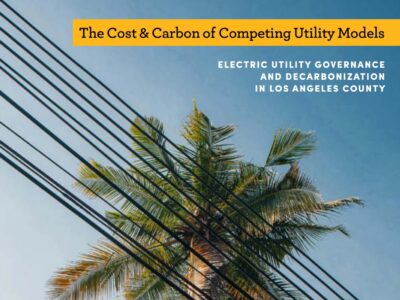Changing the Climate in the Bay State
Massachusetts has adopted an ambitious goal of reducing GHG levels 20% below the 1990 level by 2020. According the NY Times, the program involves a mix of tools:
- Importing more hydropower from Quebec.
- Reducing vehicle miles driven through insurance incentives.
- Encouraging owners of old oil furnaces to replace them with more efficient systems.
- Using the existing cap-and-trade system adopted by Northeastern states to control emissions from electricity generators.
- Existing green building standards.
Massachusetts officials say their program “puts the lie to the Chicken Little-oriented debate on the national scene” — that is, to claims that reducing greenhouse gases would be an economic disaster.
Reader Comments
3 Replies to “Changing the Climate in the Bay State”
Comments are closed.







I think that we are in the grip of the biggest and most insane hoax in history, and unless the public get wise to it soon, we will all be parted from what wealth we have.
Lets take a simple economic view of what is likely to happen.
In the absence of sufficient alternative solutions/technologies, the only way western countries can ever attain the IPCC demands of CO2 emissions reduced to 40% below 1990 levels, (thats about 60% below todays) is to machine restrictions on the use of fossil fuels. Emission Trading schemes are an example.
As the use of fossil fuels is roughly linear with anthropogenic CO2 emissions, to attain a 60% reduction of emissions , means about the same proportion of reduction of fossil fuel usage, including petrol, diesel, heating oil, not to mention coal and other types including propane etc.
No matter how a restriction on the use of these is implemented, even a 10% decrease will make the price of petrol go sky high. In otherwords, (and petrol is just one example) we can expect, if the IPCC has its way, a price rise on petrol of greater than 500%.
First of all, for all normal people, this will make the family car impossible to use. Worse than that though, the transport industry will also have to deal with this as well and they will need to pass the cost on to the consumer. Simple things like food will get prohibitively expensive. Manufacturers who need fossil energy to produce will either pass the cost on to the consumer or go out of business. If you live further than walking distance from work, you will be in trouble.
All this leads to an economic crash of terrible proportions as unemployment rises and poverty spreads.
I believe that this will be the effect of bowing to the IPCC and the AGW lobby. AND as AGW is a hoax it will be all in vain. The world will continue to do what it has always done while normal people starve and others at the top (including energy/oil companies and emission traders) will enjoy the high prices.
Neither this scenario nor any analysis of the cost of CO2 emission reductions is included in IPCC literature, and the Stern report which claims economic expansion is simply not obeying economic logic as it is known in todays academic world.
The fact that the emission reduction cost issue is not discussed, leads me to believe that there is a deliberate cover up of this issue. Fairly obviously the possibility of starvation will hardly appeal to the masses.
AGW is baloney anyway!
Cheers
Roger
http://www.rogerfromnewzealand.wordpress.com
Dear Roger,
Thanks for your insightful comments and accurate analysis of the emission reduction cost issue cover-up. The global warming political movement is slowly but surely being exposed, discredited and defeated by the power of truth. Please continue to contribute to this forum. Your help is appreciated.
Not content refudiating the science of climate change, roger turns attention to economics, beginning with supply and demand:
“even a 10% decrease [in the use of petrol] will make the price of petrol go sky high.”
roger points out that this take was not included the IPCC report. Surprised?
More to the point, how effective are the proposed Mass measures? Without INCREASING the price of fossil fuels, how effective will the energy efficiency measures be, how effectively will they be applied, and to what extent will rebound undercut the measures?
Another important question, which I’m really surprised was not raised in the post, is whether the trade-off–Quebec hydro for fossil fuel-generated electricity–makes good environmental policy. Sometimes fossil fuels are cleaner than flooding hundreds of thousands of hectares of pristine boreal forest and re-engineering the native hydrology of a entire region.